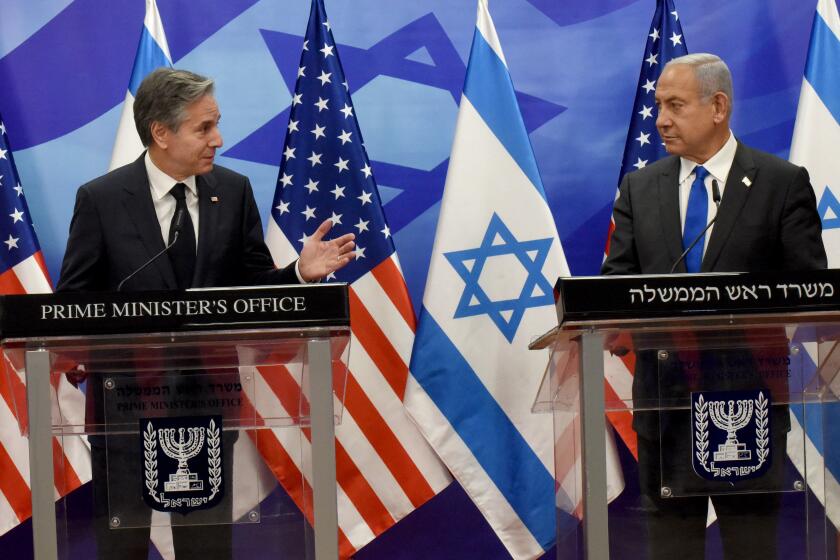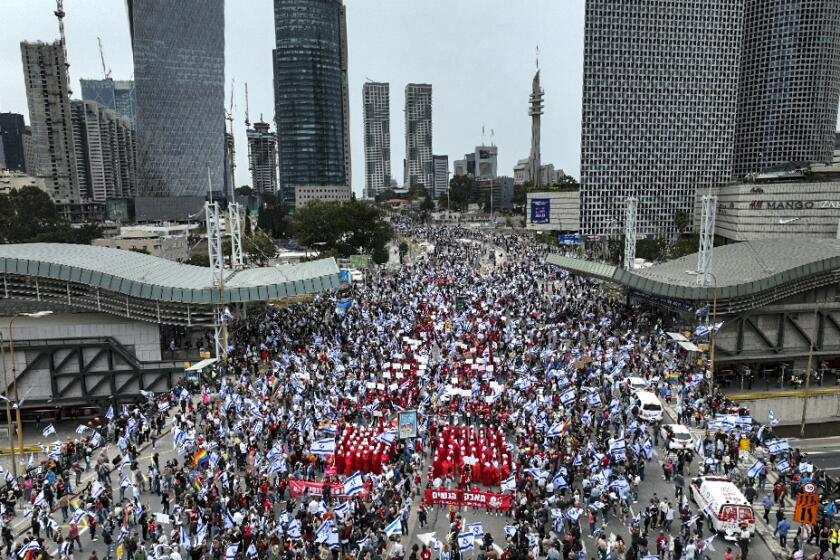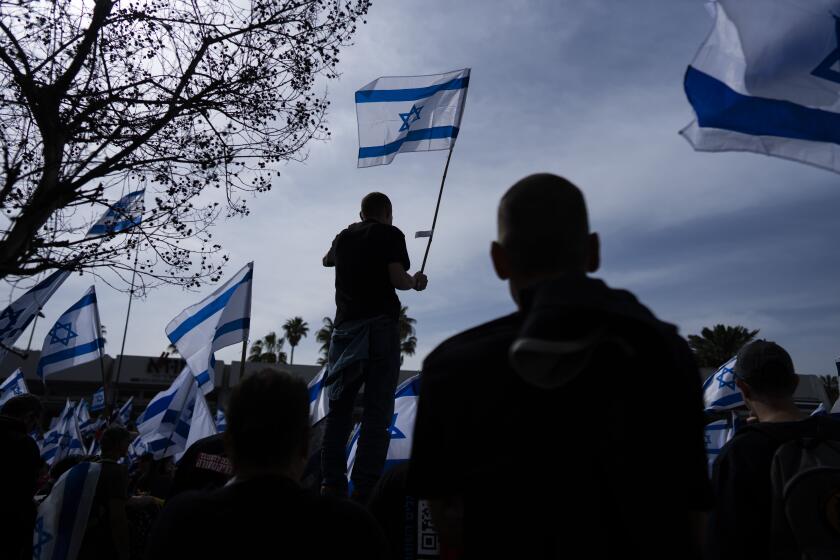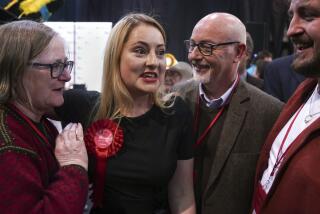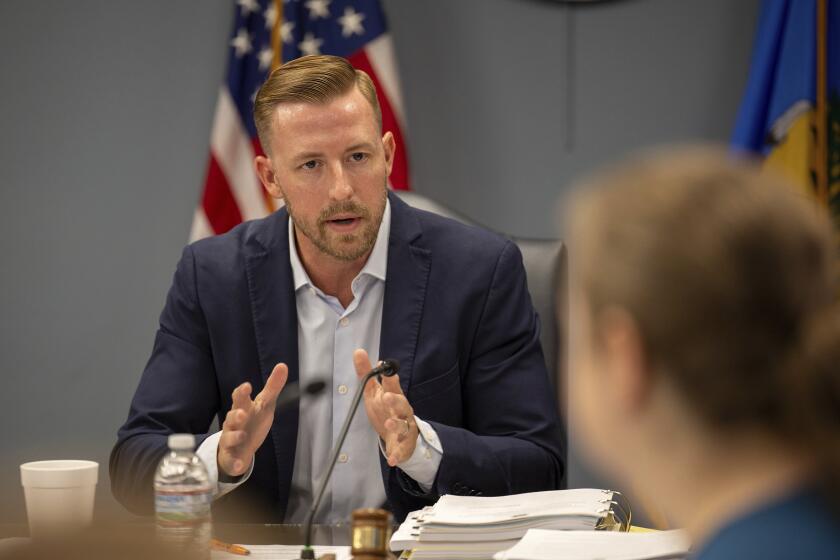Protesters greet Netanyahu as he meets U.K. leader in London
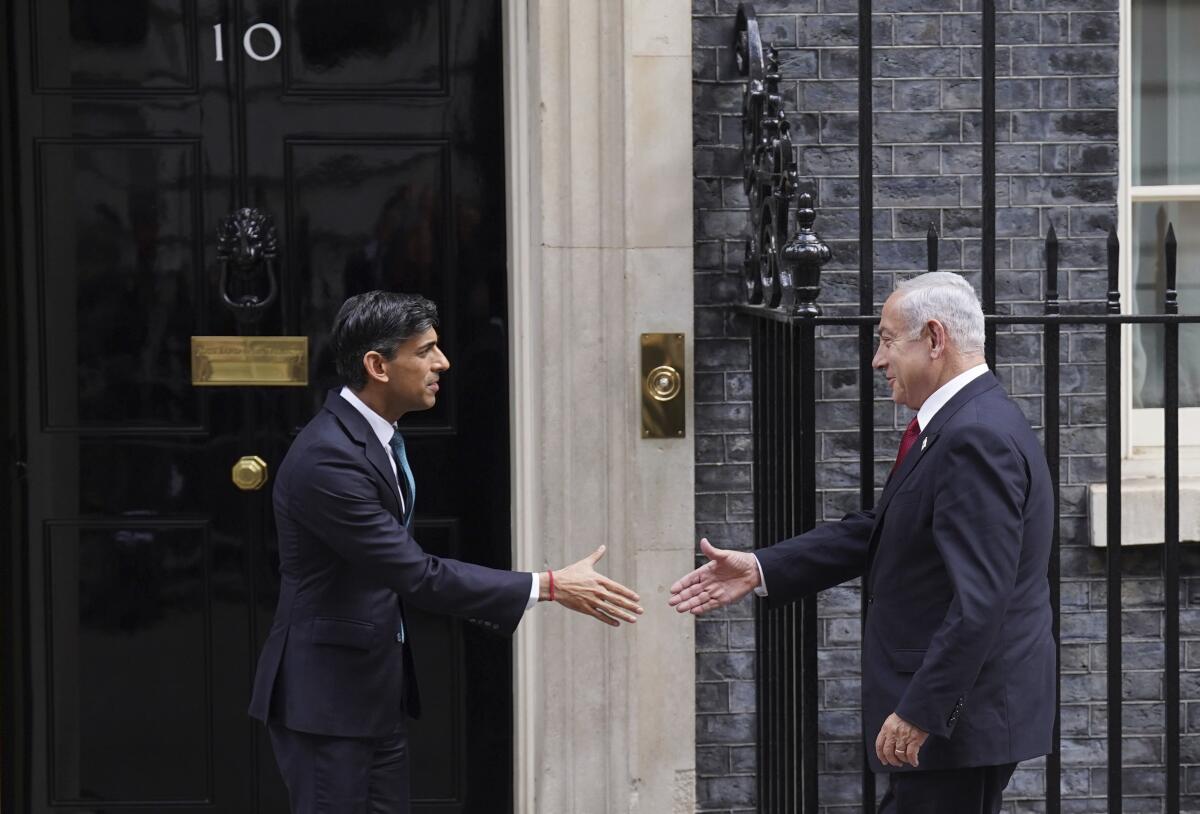
LONDON — British Prime Minister Rishi Sunak held talks with Benjamin Netanyahu in London on Friday as protesters shouting “Shame!” in Hebrew demonstrated against the Israeli leader’s right-wing policies and his plans to overhaul the country’s judiciary.
Netanyahu had to pass by hundreds of protesters waving Israeli flags and waving signs calling for the defense of Israeli democracy as he arrived at 10 Downing St. for discussions that focused on the war in Ukraine and concerns about Iran’s nuclear program.
Sunak also raised Netanyahu’s proposed judicial reforms, which have sparked mass protests in Israel and beyond. One placard in London read: “We are Israelis and Jews living in the U.K. demonstrating against Prime Minister Netanyahu, who is leading a judicial coup turning Israel into a dictatorship.”
Some women protesting outside Downing Street wore red robes and white caps inspired by “The Handmaid’s Tale,” a novel and TV series set in a dystopian future. Similarly clad demonstrators have become fixtures of the mass protests roiling Israel.
Blinken held several hours of consultations in one-on-one meetings with Israeli Prime Minister Benjamin Netanyahu, President Isaac Herzog and Foreign Minister Eli Cohen, who has been on the job just under a month as part of Netanyahu’s new far-right government.
Sunak “stressed the importance of upholding the democratic values that underpin our relationship, including in the proposed judicial reforms in Israel,” the British leader’s office said in an official readout of the meeting.
Other leaders, including U.S. President Biden, have expressed concern about proposed changes.
Netanyahu’s proposals would give his government more control over judicial appointments, weaken the Supreme Court by limiting judicial review of legislation and allow Parliament to overturn court decisions with a simple majority vote.
He arrived in the U.K. as protesters in Israel blocked roads and clashed with police. The planned judicial system overhaul have ignited the biggest protests in the country’s history amid rare dissent from people throughout Israeli society, including military reservists, navy veterans, high-tech businesspeople and former officials.
Israel’s parliament has passed the first of several laws proposed as part of a contentious judicial overhaul that has sparked massive public protests.
In London, Netanyahu also was met by a pro-Palestinian demonstration. His government has been criticized for its hard-line policy toward Palestinians, including recent comments by a government minister who denied the existence of the Palestinian people and their right to self-determination.
Sunak, during his meeting with the Israeli prime minister, “reiterated our support for two-state solution,” as well as Britain’s view that Israel’s West Bank settlements are illegal and ”contrary to the cause of peace,” spokesman Jamie Davies said.
“Israel is a vital international partner for the United Kingdom, and the prime minister was visiting London, and this was an important opportunity to talk about issues that matter to both countries, whether that’s the threat of Iran, Russia, new trade and investment … as well as peace and stability in the Middle East,” Davies said.
Netanyahu’s office said the two leaders discussed the rapidly advancing nuclear program of Israel’s archenemy, Iran, as well as “deepening strategic cooperation in security, intelligence and economic fields.”
Alicia Kearns, a lawmaker from Sunak’s governing Conservative Party and chairwoman of Parliament’s Foreign Affairs Committee, urged the government to be more forceful in challenging Netanyahu’s policy.
Israel’s prime minister says his government has ‘’no intention” to return to four settlements in the occupied West Bank dismantled in 2005.
“This is the time for the U.K. to work out what it means to be a critical friend to Israel and make sure that, yes, we continue to trade and to work together on security cooperation because they are a key partner, but also that we listen to our Jewish communities,” Kearns told the BBC. “And this [is] the biggest response and loudest response I’ve ever seen from a Jewish community to Israeli policies.”
As thousands of people took to the streets across Israel on Thursday, Netanyahu, who is on trial for corruption, defiantly pledged to proceed with the judicial overhaul, hours after his coalition passed a law making it harder to remove him from office.
Rights groups and Palestinians say Israel’s democratic ideals have long been tarnished by the country’s 55-year, open-ended occupation of lands the Palestinians seek for an independent state and the treatment of Palestinian Israeli citizens, who face discrimination in many spheres.
Netanyahu pushed back his departure to Britain until 4 a.m. Friday to deal with the political crisis.
Associated Press writer Jill Lawless contributed to this story.
More to Read
Sign up for Essential California
The most important California stories and recommendations in your inbox every morning.
You may occasionally receive promotional content from the Los Angeles Times.
